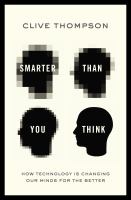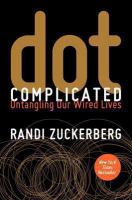Book Reviews: New on the ‘Net
Forty years ago, a paper published by Vinton G. Cerf and Robert E. Kahn (‘A Protocol for Packet Network Interconnection‘) detailed the network communication protocols that would become TCP/IP – the packet switching technology that made the internet possible. TCP/IP moves data from A to Z, and some call it the most significant development in internet history. The authors, now in their 70’s, changed the world; but their names are only known to internet history geeks. This post, detailing new books about the internet, is dedicated to them.
 Without Their Permission : how the 21st century will be made, not managed by Alexis Ohanian. Co-founder of the website Reddit.com uses his own experience as an internet entrepreneur to guide other innovators in dealing with the ups and downs of launching a new product, finding a market and dealing with venture capitalists. He also reveals his personal story and discusses his ideas on a variety of topics, to inspire others to live up to their potential as inventors.
Without Their Permission : how the 21st century will be made, not managed by Alexis Ohanian. Co-founder of the website Reddit.com uses his own experience as an internet entrepreneur to guide other innovators in dealing with the ups and downs of launching a new product, finding a market and dealing with venture capitalists. He also reveals his personal story and discusses his ideas on a variety of topics, to inspire others to live up to their potential as inventors.
 Smarter Than You Think : how technology is changing our minds for the better by Clive Thompson. Several books explaining the negative effect of the internet on thinking and relationships have been reviewed here, including The Shallows and Alone Together. These books describe the adverse consequences of internet use on attention, learning and memory as well as the deteriorating ability to think deep thoughts or form deep friendships. By contrast, Clive Thompson’s new book describes the positive effects of our digital experience. The internet is producing a new style of human intelligence that is more global and more intuitive. He explains how modern technology is making people better connected and more intelligent, enabling people to solve significant problems for the individual and society. Also available as an audiobook.
Smarter Than You Think : how technology is changing our minds for the better by Clive Thompson. Several books explaining the negative effect of the internet on thinking and relationships have been reviewed here, including The Shallows and Alone Together. These books describe the adverse consequences of internet use on attention, learning and memory as well as the deteriorating ability to think deep thoughts or form deep friendships. By contrast, Clive Thompson’s new book describes the positive effects of our digital experience. The internet is producing a new style of human intelligence that is more global and more intuitive. He explains how modern technology is making people better connected and more intelligent, enabling people to solve significant problems for the individual and society. Also available as an audiobook.
 The End of Big : how the internet makes David the new Goliath by Nicco Mele.
The End of Big : how the internet makes David the new Goliath by Nicco Mele.
The first generation of computers belonged to universities, corporations, government and the military, which controlled their use. 40 years later, the dominant communications technologies – the PC, the internet and mobile phones – place enormous political and economic power in the hands of individuals, which is disrupting traditional ways of running political campaigns, reporting the news, providing government services, managing businesses, providing entertainment and changing societies. Media strategist Nicco Mele calls for newly powerful institutions like Facebook, Google and Twitter to play a civic role in our newly radicalized world. Thoughtful material is presented in a choppy style perhaps more suited to a blog. Also available as an audiobook.
 Return on Influence : the revolutionary power of Klout, social scoring, and influence marketing by Mark W. Schaefer. Individuals are influenced more by the people with whom they interact than by the messages they get from mass media. Today most consumers access social networks through broadband connections in their homes and mobile phones in their pockets, and influence is widely distributed. Individuals have great opportunities to be influential and to be influenced. Marketing consultant Mark Schaeffer describes the strategies that brands use to build networks, to provide compelling content, and to create advocates who will distribute the content virally.
Return on Influence : the revolutionary power of Klout, social scoring, and influence marketing by Mark W. Schaefer. Individuals are influenced more by the people with whom they interact than by the messages they get from mass media. Today most consumers access social networks through broadband connections in their homes and mobile phones in their pockets, and influence is widely distributed. Individuals have great opportunities to be influential and to be influenced. Marketing consultant Mark Schaeffer describes the strategies that brands use to build networks, to provide compelling content, and to create advocates who will distribute the content virally.
 Dot Complicated : untangling our wired lives by Randi Zuckerberg. The older sister of Mark Zuckerberg and former Director of Market Development for Facebook is now Editor-In-Chief of a digital lifestyle website, Dot Complicated. Her new book of the same name is about how social media have made our lives more complex, and how we can balance our connected world with our real-time world of family, friends and coworkers who stand beside us every day.
Dot Complicated : untangling our wired lives by Randi Zuckerberg. The older sister of Mark Zuckerberg and former Director of Market Development for Facebook is now Editor-In-Chief of a digital lifestyle website, Dot Complicated. Her new book of the same name is about how social media have made our lives more complex, and how we can balance our connected world with our real-time world of family, friends and coworkers who stand beside us every day.
© Reviewer: Meg Trauner & Ford Library – Fuqua School of Business.
All rights reserved.